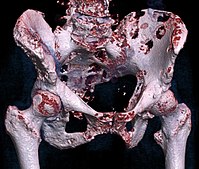
Photo from wikipedia
Purpose The impact of surgery on non-functional pancreatic neuroendocrine tumors (NF-PNETs) ≤2 cm is controversial. This study sought to demonstrate the impact of surgery on the prognosis of NF-PNETs ≤2 cm with… Click to show full abstract
Purpose The impact of surgery on non-functional pancreatic neuroendocrine tumors (NF-PNETs) ≤2 cm is controversial. This study sought to demonstrate the impact of surgery on the prognosis of NF-PNETs ≤2 cm with different biological behaviors. Methods Patients with NF-PNETs ≤2 cm from 2004 to 2015 in the Surveillance, Epidemiology, and End Results database were included in this study. An inverse probability of treatment weighting (IPTW) method was used to reduce the selection bias. Kaplan–Meier survival analysis and Cox proportional hazards regression were used to evaluate the effect of surgery on the prognosis. Results In the IPTW-adjusted Cox proportional hazards regression analysis, surgery improved the cancer-specific survival (CSS) in the overall cohort (hazard ratio [HR], 0.187; 95% confidence interval [CI], 0.102–0.343; p < 0.001), patients with poorly differentiated or undifferentiated tumor grades (HR, 0.238; 95% CI, 0.105–0.64; p < 0.001), patients with distant metastasis (HR, 0.102; 95% CI, 0.021–0.496; p = 0.005), and patients with local invasion (HR, 0.059; 95% CI, 0.005–0.683; p = 0.002). Surgery did not improve the CSS in patients with lymph node metastasis only (HR, 0.26; 95% CI, 0.0462–1.461; p = 0.126) or patients with well or moderate differentiation while without distant and lymph node metastasis (HR, 0.387; 95% CI, 0.146–1.028; p = 0.057). Conclusions Among patients with NF-PNETs ≤2 cm, different biological behaviors correlate with different prognostic impacts of surgery. As long as distant metastasis does not occur and the grade is well–moderately differentiated, these patients will not benefit from surgery no matter whether lymph node metastasis occurs or not. However, when local invasion appears in this group of patients, surgery should be performed. Moreover, patients with a tumor grade of poorly differentiated or undifferentiated or those with distant metastases may benefit from surgery.
Journal Title: Frontiers in Surgery
Year Published: 2022
Link to full text (if available)
Share on Social Media: Sign Up to like & get
recommendations!